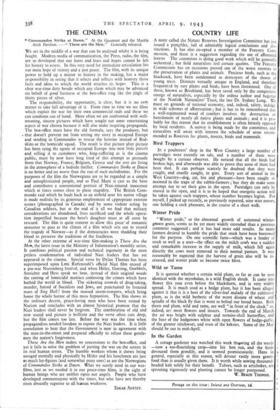COUNTRY LIFE A BODY called the Nature Reserves Investigation Committee
has just issued a pamphlet, full of admirably logical conclusions and distinctions. It has also co-opted a member of the Forestry Commission, and there is a suggestion regarding the use of afforested forests The committee is doing good work which will be generally welcomed ; but field naturalists feel certain qualms. The Forestry Commission has on occasions proved one of the worst enemies to the preservation of plants and animals. Precicus birds, such as the blackcock, have been condemned as desuoyers of the shoots of young trees. Districts virtually unique in England, and therefore frequented by rare plants and birds, have been threatened. One of these, known as Breckland, has been saved only by the competitive energy of naturalists, especially by the ardent author and begetter of the Norfolk Naturalists' Trust, the late Dr. Sydney Long. We must on grounds of national economy, and, indeed, safety, indulge in wide schemes of afforestation ; but it has to be remembered that a well-regimented wood of conifers involves the destruction or banishment of nearly all native plants and animals ; and it is probably for this reason that its establishment is often bitterly opposed by local residents. A survey is being made by the committee, and naturalists will await with interest the schedule of areas recommended as Reserves for plants, insects, birds and mammals.
Bird Trappers
In a poulterers' shop in the West Country a large number of partridges were recently on sale, and a number of them were bought by a curious observer. He noticed that all the birds had broken legs, and afterwards was able to prove that none of them had been shot. It can perhaps scarcely be doubted that they were caught, and cruelly caught, in gins. Every sort of animal in the West Country—dog, cat, fox and pheasant—have been caught or maimed in the traps of the rabbit-farmers ; but they do make some attempt not to set their gins in the open. Partridges can only be snared in the open, and it is to be hoped that energetic action will be taken against such trappers, whose number becomes legion. For myself, I picked up recently, as previously reported, nine wire nooses, one holding a cock pheasant, in the course of a short walk.
Winter Pride "Winter pride," or the abnormal growth of autumnal wintergrown grain, seems to be yet more widely extended than a previous comment suggested ; and it has had more odd results. So many farmers desired to humble the pride that stock have been borrowed for the purpose. On one scientific farm—which was a lender of stock as well as a user—the effect on the milch cows was a sudden and remarkable increase in the supply of milk, which fell again directly the cows were removed to their normal pasture. It may reasonably be expected that the harvest of grain also will be increased, and winter pride so become twice blest.
Wild or Tame It is queried whether a certain wild plum, so far as can be seen identical with the myrobalan, is a wild English shrub. It came into flower this year even before the blackthorn, and is very widely spread. It is much used as a hedge plant, but it has been alleged against it that it is a host of the silver-leaf malady of the cultivated plum, as is the wild berberis of the worst disease of wheat and spindle of the black fly that is wont to befoul our broad beans. Both thorn and plum, wild and tame, are well "in front of the clock," as, indeed, are most flowers and insects. Towards the end of March the air was bright with sulphur and tortoise-shell butterflies, and the base of the hedgerows white with open flowers of hedge-garlic, of the greater stitchwort, and even of the keksies. Some of the May should be out in mid-April.
In the Garden A cottage gardener was watched this week throwing all the weeds —now a too-flourishing crop—into his hen run, and the birds devoured them greedily, and it seemed promiscuously. Hens in general, especially at this season, will devour vastly more greenfood than is usually given them. It is worth while sowing thousandheaded kale solely for their benefit. Tubers, such as artichokes, are sprouting vigorously and planting cannot be longer postponed.
W. BEAC:H THOMAS.






















 Previous page
Previous page